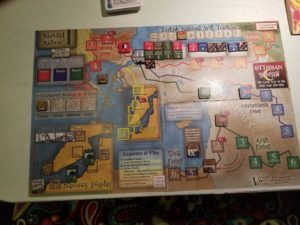Playing a lot….Posting not so much….
No shortage of reviews or comments about this game, so I’ll stick with a general overview. It is one of the States of Siege series by Victory Point Games. The first game was Soviet Dawn.
Nice quality components. The interlocking “puzzle” map is great, but the paper map tends to show crease wear after a few playings. That’s the only negative thing I can say about this game.
This is a fun game and an intriguing examination of the same topic as the more complex, involved and time-consuming Pursuit of Glory.
As with the GMT product, the player must juggle the demands of several active fronts and react to out of theater events. These pressures only increase as the game, and introduction of new card decks, moves along.
The Ottoman Player is tasked with defending Constantinople while maintaining National Will until all Event Cards are exhausted. Initial set-up is so simple the information is contained in a separate event card.
The core of the game is the card deck, which is divided into three sub-decks, representing three phases of the war. Each card has Event, Advance and Action sections, along with historical commentary concerning the Event. Events can be in-theater or out-of-theater, requiring the resolution or introduction of an element into the game. Advances dictate which enemy force or forces advance towards Constantinople, and the number of actions dictate the limits of what the Ottoman player can do: roll to stop an advance (by a die roll greater than the invading army’s strength), allocate resources to off-map theaters or foment rebellion in Persia, India or Afghanistan.
The on-map theaters are the Sinai, Arab, Mesopotamia, Caucasus, and Gallipoli fronts. In addition the Aegean narrows leading towards Constantinople must be defended against British naval attack. British success here will immediately end the game.
While the initial three fronts are manageable, the addition of a fourth or fifth can overwhelm the Ottomans.
I played four games and have had different outcomes each time. These have ranged from total defeat to a marginal victory. It is very hard to gain a decisive victory.
In three of the four games, I was fortunate to have success in the off-map battles/events. These events directly effect National Will. A victory increases National Will, while defeats reduce it. Roll poorly, and your game will be a short and/or disastrous one.
For this reason, I devoted early actions (before other on-board theaters come into play) funneling resources to the three off map theaters in order to gain die roll modifiers for these off-map events.
The Ottoman player also receives German aid or elite units to modify combat rolls. These help avoid the loss of cities that have a negative impact on National Will.
One disastrous event that cannot be avoided is the War Weariness event. This leads to a -1 die roll modifier on all combats for the rest of the game. This event usually occurs just when the Ottoman player is assailed on all fronts, with every roll being critical.
Replayability is excellent because the inclusion of a new card deck is driven by a specific drawn card. Draw this card early, and the deck expands. This is not a good thing for the Ottoman player because the three decks are composed in historical chronological sequence and, historically, the further the war progressed, more adverse situations developed. Again, not historical, but dynamic in terms of game play.
Great Game, Great Fun.
Here is photo taken of my marginal in the bizarre lighting and bizarre gravitational camera pull of the Airstream.
Note the high number of Off-Map Theater victories, defeat of British at Gallipoli, and defeat of Russians in Caucauses. However, it was a near-run thing given proximity of French in Salonika and Arabs (!) to Constantinople.
